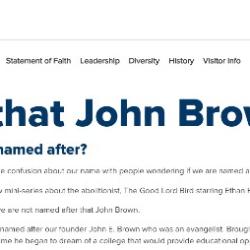“Every aristocracy that has ever existed has behaved, in all essential points, exactly like a small mob.” — G.K. Chesterton
Main Street’s Doug Foote reports that the Obama administration and banks are moving closer to a slap-on-the-wrist foreclosure-fraud settlement:
There was talk over the past few months about a $25 billion settlement, which would help less than 10 percent of underwater homeowners. Now today we’re hearing about an even smaller settlement, valued at around $19 billion.
Of course these are huge numbers in theory, but we’re talking about the combined financial power of Bank of America, Citigroup, J.P. Morgan Chase, Wells Fargo, and Ally Financial. It’s not even a slap on the wrist – this is like a tap on the shoulder, or a Facebook poke.
Dave Dayen at Firedoglake points out that there is $750 billion in negative equity in America, and a $19 billion settlement will deal with about 2.5 percent of that. And helping a million homeowners is great, but there are about 11 million homes in foreclosure and another 7.5 million homes on the precipice.
Not to mention that, according to reports, the proposed settlement with the banks would keep the participating states from “pursuing various claims against them in the future.” Translation: Banks don’t want anyone to really investigate the acts they committed against the American homeowners and communities. So-called “robo-signing,” the practice of assigning one person to approve thousands of foreclosures over a short period of time without checking the paperwork, is the focus of the settlements, but could be the tip of the iceberg if the administration launched a full-scale investigation.
Foote suggests those who find this unsatisfactory might want to contact Associate Attorney General Thomas Perrelli and tell him that. You can contact him at AskDOJ at usdoj.gov.
Below is a round-up of other recent news about banks behaving badly.
Finance Addict: “Robosigning Credit Cards: The Next Major Bank Scandal?“
The widespread and systematic robosigning of mortgage documents have created a real unresolved nightmare. And now there are indications that similar issues may exist within the credit card industry. Consider the very curious behavior of JP Morgan Chase, as reported in that little-noticed American Banker article from last week:
JPMorgan Chase & Co. has quietly ceased filing lawsuits to collect consumer debts around the nation, dismissing in-house attorneys and virtually shutting down a collections machine that as recently as nine months ago was racking up hundreds of millions of dollars in monthly judgments.
When a bank leaves money on the table for no obvious reason, you know that something’s not quite right.
Bold Faith Type: “New Report Shows How Payday Lenders Profit From Poverty“
While payday lenders prey on the most vulnerable and drive the poor into never ending cycles of indebtedness, the lending institutions reap huge profits by borrowing from big banks like Wells Fargo, JPMorgan Chase, US Bank and Bank of America at extremely low interest rates, “which they in turn lend out as payday loans charging between 260 percent and 570 percent APR.”
MSN Money: “5 businesses that rip off the poor“
5. Banks
A 2008 Federal Deposit Insurance Corp. study found that people earning less than $30,000 were far more likely to incur overdraft fees than those with higher incomes. … At the time, most banks were automatically enrolling customers in so-called bounce-protection plans that allowed overdrafts and then levied a $30 to $35 fee for each over-limit transaction. Concern about the programs’ effect on low-income people and seniors on fixed incomes helped lead Congress to abolish the programs and require banks to get consumers’ consent. Most people have opted out.
Now banks are finding other ways to ding those who have trouble maintaining big balances in their accounts. The primary method: monthly “maintenance” or account fees. Bankrate.com’s 2011 Checking Survey found only 45 percent of noninterest accounts are free, compared with 65 percent in 2010 and 76 percent in 2009. The monthly fees often range from $8 to $15.
Louise Story: “Big Banks Facing Inquiry Over Possible Insurance Fraud“
A New York State financial services agency is investigating several large banks to see whether they fraudulently steered homeowners into overpriced insurance policies.
… JPMorgan Chase, Bank of America, Citigroup and Wells Fargo are among the major companies involved in the inquiry by the office of Benjamin M. Lawsky, the superintendent of New York State’s Department of Financial Services, according to a person briefed on the investigation who asked to remain unidentified because the matter was private.
Felix Salmon: “Bank charge of the day, mortgage-payment edition“
Salmon reports that Citibank’s “BiWeekly Advantage Plan[R]” has:
… an up-front fee of $375, plus another $39 a year, just for the privilege of making your mortgage payments every two weeks rather than every month. … [And] it turns out that Citi is making significantly more than $375 plus $39 per year for this service. …
Sheila Bair: “Why it’s time to break up the ‘too big to fail’ banks“
Supersizers argue that their scale is necessary to meet the financial needs of multinational corporations. But … if there were really that much value in supersizer services, presumably it would show up in shareholder returns. But it doesn’t.
… So, shareholders, get ye to the boards that represent you and ask them loudly about whether your company would be worth more in easier-to-understand pieces. The public-policy benefits of smaller, simpler banks are clear. It may be in the enlightened self-interest of shareholders as well.
See also:
- Gretchen Morgenson: “From East and West, Foreclosure Horror Stories“
- Consumerist: “Bank of America & Chase Continue to Be Penalized for Sucking at Loan Modifications“
- Alejandro Lazo: “California and Nevada join forces in mortgage probe“
- Consumerist: “Wells Fargo Changes Consumer Agreement, Banning You From Suing Them“
- Elise Foley: “Immigrants To Wells Fargo: Stop Investing In For-Profit Detention“
- Sarah Jaffe and Joshua Holland: “Which Bank Is the Worst for America? 5 Behemoths That Hold Our Political System Hostage“
















